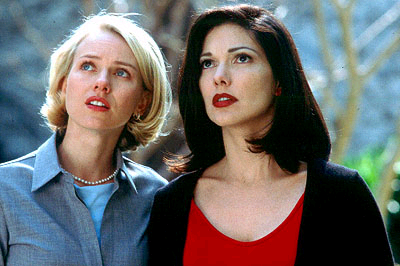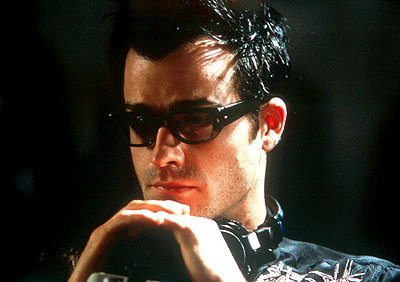

After the entire Twin Peaks and On the Air experience left David Lynch with an ill feeling with television, he tried again with Mulholland Drive, a pilot intended for ABC. Well, ABC did not take the pilot, leaving the project in limbo until Studio Canal agreed to fork over some more money and turn the pilot into a movie. The result is a strange mix of television and feature film, with decidedly 'Lynchian' elements thrown in. Mulholland Drive is a compelling and confusing movie, one which garnered Lynch (The Straight Story, Lost Highway) the Best Director Award (shared with Joel and Ethan Coen) at the 2001 Cannes Film Festival.
Mulholland Drive starts innocuously enough. Betty Elms (Naomi Watts, Ellie Parker, Strange Planet), a young, attractive woman from Ontario comes to Hollywood in search of fame as an actress. Betty finds a striking brunette (Laura Elena Harring, Little Nicky, Hoover Park) in her aunt's apartment. This woman is injured and has amnesia, and calls herself Rita after a movie poster. Rita remembers only snippets of the past, and Betty agrees to help her sift through the clues to regain her identity. All Rita remembers is that she was going to Mulholland Drive. Concurrently, Adam (Justin Theroux, Zoolander, The Broken Hearts Club), a director, is losing control over his movie. Financial backers are demanding he cast a specific woman as the lead, and when he refuses his life begins to go to hell. His wife abandons him and he mysteriously goes bankrupt. To this point, Mulholland Drive is surprisingly, almost disappointingly, easy to follow. Then, Lynch has a plot point similar (not in nature, but in effect) to the one in Lost Highway which caused audiences to scratch their heads in bewilderment.
The television pedigree appears at numerous places. There are numerous characters and situations seemingly abandoned in the movie, which presumably would be fleshed out had there been a series. This actually makes the movie more surreal. Instead of moving from point A to point B, Lynch defies narrative conventions and moves in any direction he chooses. This is especially true as Mulholland Drive nears its conclusion. Aside from some fairly explicit sex scenes, it is not clear what Lynch supplemented to the pilot. All the strangeness may already have existed. Lynch is notorious for not wanting to explain his films. Mulholland Drive has a number of possible explanations. Maybe the first part is real and the second not, or vice versa. Maybe they are both real. Whatever it is, typical Lynch signposts like a dwarf, flashing lights, ominous humming, and truly hilarious sequences pepper the film, giving it an odd scatterbrained quality that feels like it should be there.
Rounding out Mulholland Drive are a number of good performances from relative unknowns. This is a highest profile project yet for Watts, whose face radiates innocence. Betty is entirely new to the Hollywood scene, and is clearly too 'nice' to belong. She is fresh-faced, eager, and always willing to help. When Watts' character undergoes a radical change at the end, she does an excellent job of shifting gears into a vastly different personality. This contrasts to Rita, who, despite her memory loss, has a sultry quality to her. Both women are in the process of discovering not necessarily who they are, but who they have the potential to become in the future. Theroux's scenes seem there only for amusement, and he does a good job with his constant look of exasperation at what is going on around him. Watching Mulholland Drive is like watching a dream unfold. Much of it makes sense, much of it doesn't, but it is always weird and thought provoking.